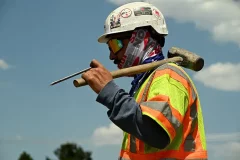This audio is auto-generated. Please let us know if you have feedback.
When Jaime Garcia was working on construction jobsites, he saw multiple Spanish speaking tradesworkers on the jobsite who did not receive the proper safety training in their native language.
“The amount of people that took the training but did not understand the training was massive. It was a huge gap,” said Garcia, who worked as an electrician and safety manager. When he urged leaders and subcontractors to conduct classes in Spanish, he was told there was no time for that.
“I’m like, ‘Hmm, we need to train them, big time. We’re going to get someone hurt or killed out here,’” he said. As a result, in 2020, Garcia founded All-In Safety Professionals, a Raleigh, North Carolina-based firm offering bilingual safety training.
“We had a lot of subcontractors that I knew that needed training,” Garcia said. “They were just showing up to these places, somebody would collect their money, sit them in their class talking English. They play one or two videos and sign a card and dip. And I didn’t like that.”
The number of Hispanic or Latino workers in all industries who died on the job increased 42%, to 727 from 2011 to 2021, according to the Bureau of Labor Statistics. In that time, the percentage of construction workers who were Hispanic or Latino who died at work also steadily increased.
“We know without a doubt that it’s massively impactful to the safety of and wellbeing of these workers, but also then to the safety and efficiency of all of these operations as well as from a damage and delay standpoint,” said Loretta Mulberry, a language access consultant.
In addition, that language barrier, or lack of resources, can create a system that holds back great workers, Mulberry said. That’s a disadvantage to both the business and the individual.
“It’s either ‘I don’t have the language skills to pass this English test,’ or ‘I am too self-conscious. I’m too nervous about my lack of English to get after that opportunity,’” she said. “So you see it from both sides. People are holding themselves back, but also the system is holding them back too.”
For a long time, experts say, the “no-time” attitude has pervaded around providing extra education or resources, though that’s beginning to change. However, Garcia and Mulberry still believe more can be done.
Translation and interpretation
Often, one member of a working crew — the person who speaks the best English — steps up as a de facto interpreter. In addition to doing other work on the jobsite, that interpreter communicates with crews about any and all important information from the general contractor. Though that role is vital, it also should require additional training, according to Mulberry.
“Speaking a language is not the same thing as being qualified to do translation and interpreting,” Mulberry said. “The skills are not the same.”
In fact, translation refers to the act of copying language in written form, while interpretation is done verbally. Each case requires both specificity and nuance.
In addition, not every person who speaks Spanish speaks the same kind of Spanish. A single jobsite could feature workers from Mexico, Cuba, Honduras, Puerto Rico or other Hispanic regions that have differences in dialect, small or large.
Mulberry said she sees firsthand how much people want the most important information to be communicated as familiarly as possible.
“Anecdotally, you talk to anybody who’s ever studied a second language, even being very comfortable, fluent in their second language, and you ask them, ‘If your life were on the line, what would you want this information in English, Spanish, Polish, whatever it may be?’ People will always say, ‘My native language,’” she said.
Speaking my language
All-In Safety Professionals focuses on meeting with subcontractors that don’t already have a dedicated safety professional, Garcia said. Those roles can be expensive, especially when potentially hiring someone who is





